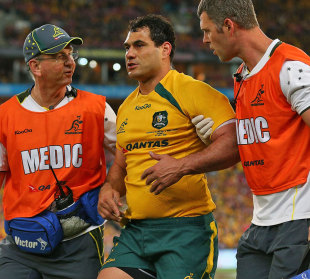|
International Rugby
Former IRB medical chief demands action on concussion
ESPN Staff
July 15, 2013

Wallabies flanker George Smith is helped from the field during their third Test clash with the Lions in Sydney earlier this month - he returned shortly after
© Getty Images
Enlarge
Former International Rugby Board medical advisor Dr Barry O'Driscoll has urged the sport's governing body to urgently review the way they deal with concussion.
Pitchside Suspected Concussion Assessment (PSCA)
O'Driscoll reluctantly resigned from the IRB last year - after 15 years service - in protest at the introduction of the Pitch Side Concussion Assessment (PSCA) trial and he has reiterated his concerns following a high-profile incident involving Australia flanker George Smith during their third Test clash with the British & Irish Lions earlier this month. Smith was clearly left dazed and confused following a clash of heads with Lions hooker Richard Hibbard and had to be helped from the field - but the veteran flanker passed the PSCA test and returned to the action a few minutes later. "'It obviously affected me," recalled Smith after the game. "You saw me snake dancing off the field. I passed the [concussion] tests that were required within those five minutes and I got out there.'' The alarming events were widely criticised on social media by players and fans alike and O'Driscoll, a former Ireland international and the uncle of Brian O'Driscoll, felt compelled to raise the issue once again with his former employers having repeatedly stressed his concerns since the beginning of the PSCA protocol trial at the start of last season, notably telling The Scotsman that 'Rugby is trivialising concussion'. RTÉ Sport reports that O'Driscoll wrote to IRB chief executive Brett Gosper and said: "My views on suspected concussion in rugby are well known and documented within the IRB. They were the reason for my resignation. The five-minute assessment of a player who has demonstrated distinct signs of concussion for 60 to 90 seconds and usually longer, is totally discredited. "There is no scientific, medical or rugby basis for the safety of this process. This experiment, which is employed by no other sport in the world, is returning the player to what is an extremely brutal arena." O'Driscoll believes that the advice of the World Conference on Concussion in Sport, which has unanimously recommended that there should be no return to play on the same day of a suspected concussion, should be the template on which rugby bases its approach. "There is huge research and, unfortunately, it is showing that concussion is much more dangerous than we thought it was. Any cognitive or physical effect (should mean) you put a return to play off. Nobody in the world does a five-minute assessment apart from rugby." He told The Scotsman: "The same player who 18 months ago was given a minimum of seven days' recovery time is now given five minutes. There is no test that you can do in five minutes that will show that a player is not concussed. It is accepted the world over. We have all seen players who have appeared fine five minutes after a concussive injury then vomiting later in the night. To have this as acceptable in rugby, what kind of message are we sending out?" O'Driscoll also fears the IRB may be leaving themselves open to a possible legal challenge similar to that currently faced by the National Football League (NFL) in the USA. CTE is chronic traumatic encephalopathy, a degenerative brain disease caused by repeated blows to the head, and the NFL stands accused of ignoring the dangers by those to have suffered having played the game. The newspaper reports that about 4,000 ex-American footballers and about 2,000 spouses and family members of footballers have filed a class action law suit against the NFL. "No sporting body in the world apart from the IRB have suggested that an athlete who has shown signs or symptoms of concussion can be cleared in five minutes," O'Driscoll stressed. "The IRB have refused to accept the significance of CTE, dementia, depression and suicide in NFL players with a history of concussion, as being in any way relevant to our game." Those concerns were played down by Dr Simon Kemp, the Rugby Football Union's (RFU) head of sports medicine and a key figure in the International Rugby Board's (IRB) efforts to address the problem in an interview with ESPN last year. But it remains a pressing issue with concussion topping the most recent RFU national injury audit.
© ESPN Sports Media Ltd
|
Live Sports
Communication error please reload the page.
-
Football
-
Cricket
-
Rugby
-
- Days
- Hrs
- Mins
- Secs
F1 - Abu Dhabi GP
Abu Dhabi Grand Prix December 11-131. Max Verstappen ()
2. Valtteri Bottas (Mercedes)
3. Lewis Hamilton (Mercedes)
4. Alexander Albon ()
5. Lando Norris ()
6. Carlos Sainz Jr ()
-
ESPNOtherLive >>
Golf - Houston Open
Snooker - China Open
Tennis - Miami Open

